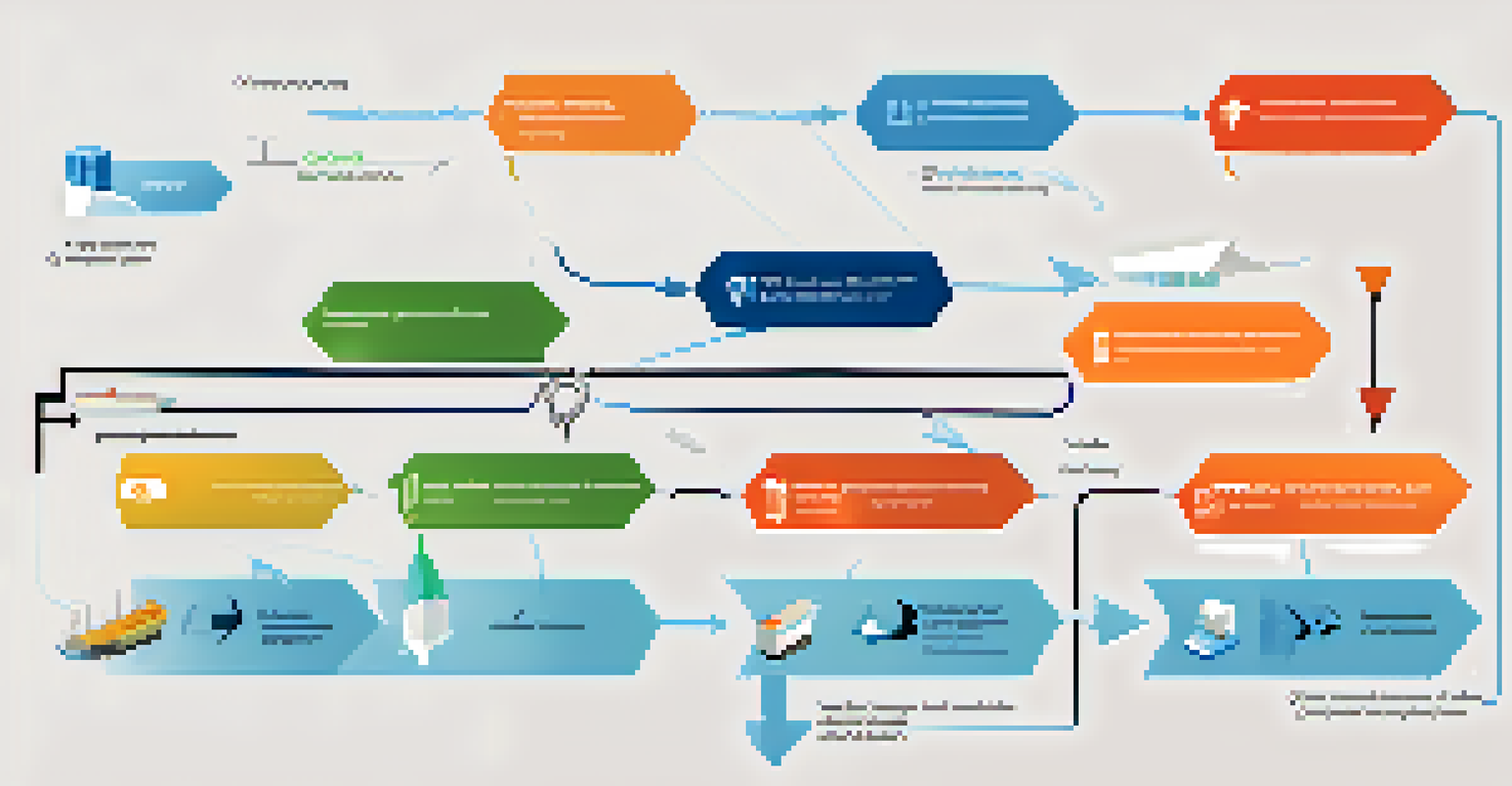The Cost Benefits of Blockchain in Supply Chain Operations

Understanding Blockchain and Its Relevance to Supply Chains
Blockchain is a decentralized digital ledger technology that records transactions across multiple computers. This ensures that the information is secure and cannot be altered retroactively without altering all subsequent blocks, making it highly reliable. In supply chains, this means that every transaction, from raw materials to the final product, is transparently recorded, enhancing traceability and accountability.
Blockchain is the tech. Bitcoin is merely the first mainstream manifestation of its potential.
Imagine a traditional supply chain as a maze with various twists and turns. Now, picture blockchain as a clear pathway that everyone can see and follow. This visibility not only reduces the chances of fraud but also helps stakeholders quickly identify where delays or errors occur in the process.
As businesses increasingly seek to optimize their operations, understanding how blockchain fits into their supply chain strategies becomes essential. By leveraging this technology, companies can streamline their processes while reducing costs associated with inefficiencies.
Reducing Costs Through Enhanced Transparency
One of the most significant benefits of blockchain in supply chains is enhanced transparency. With every participant having access to the same information in real-time, it becomes easier to track products at every stage of their journey. This transparency leads to fewer disputes over the quality and authenticity of goods, which can save companies both time and money.

Think of it like a group project where everyone can see each other's contributions. When everyone is on the same page, it reduces misunderstandings and conflicts, allowing the team to work more efficiently. Similarly, a transparent supply chain minimizes the need for intermediaries, thus cutting out additional costs.
Blockchain Enhances Supply Chain Transparency
Blockchain provides real-time access to data, reducing disputes and fostering trust among supply chain participants.
In the long run, this level of transparency can lead to improved supplier relationships and better negotiation outcomes. Companies that can provide verifiable insights into their supply chains are often viewed as more trustworthy partners.
Improving Efficiency and Speed of Operations
Blockchain technology can significantly improve the efficiency of supply chain operations by automating processes through smart contracts. These self-executing contracts automatically enforce agreements when predefined conditions are met, reducing the need for manual intervention. This means quicker transactions and fewer delays.
The future of commerce is not just about transactions, but about trust and transparency.
Imagine waiting in a long line at a store, only for the cashier to take extra time verifying your payment. Now, imagine a system where payments are automatically processed as soon as you make a purchase. That’s the kind of speed blockchain can bring to supply chains, allowing businesses to respond to market demands more swiftly.
As a result, companies can reduce lead times and improve their overall service delivery. Faster operations not only enhance customer satisfaction but also contribute to cost savings by minimizing the resources spent on delays.
Strengthening Security and Reducing Fraud Risk
Blockchain’s inherent security features make it an attractive option for supply chains. The technology uses advanced cryptography to create secure records of transactions that are nearly impossible to hack. This level of security can be a game-changer in industries where counterfeit products pose a significant threat.
Think of it like a bank vault that only a few trusted individuals can access. With blockchain, each transaction is securely locked away, and only authorized parties can view or alter the information. This greatly diminishes the risk of fraud and ensures the integrity of the data.
Boosting Efficiency with Smart Contracts
By automating processes through smart contracts, blockchain significantly speeds up transactions and reduces delays.
By integrating blockchain, companies can safeguard their assets and reputation. A secure supply chain not only protects against financial losses but also helps build customer trust, which is invaluable in today’s competitive market.
Enhancing Supplier and Customer Relationships
Blockchain technology fosters better relationships between suppliers and customers by providing reliable data on product quality and provenance. Customers increasingly demand transparency and accountability, and blockchain delivers that by allowing them to trace products back to their source. This builds trust and loyalty.
Consider a consumer who wants to know where their food comes from. With blockchain, they can easily access information about the farms and processes involved. This level of insight not only satisfies the consumer's curiosity but also empowers them to make informed purchasing decisions.
For suppliers, being transparent about their practices can lead to stronger partnerships and even open doors to new business opportunities. When everyone in the supply chain is committed to transparency, it creates a more collaborative environment focused on mutual success.
Facilitating Regulatory Compliance and Reporting
In heavily regulated industries, compliance can often be a complex and costly endeavor. Blockchain simplifies this process by maintaining an immutable record of transactions that can be audited easily. This not only saves time but also reduces the risk of non-compliance penalties.
Imagine trying to gather receipts for tax season – it can be a hassle. Now, imagine having a complete, organized digital record at your fingertips. Blockchain provides that level of organization and accessibility, making compliance reporting a breeze.
Strengthening Security Against Fraud
The advanced cryptography of blockchain ensures secure transaction records, minimizing the risk of counterfeit products.
By streamlining compliance processes, businesses can reallocate resources to focus on other critical areas, ultimately driving down operational costs. This efficiency not only helps with regulatory demands but also enhances overall business performance.
The Future of Blockchain in Supply Chains
As technology continues to evolve, the potential applications of blockchain in supply chains are expanding. From integrating Internet of Things (IoT) devices for real-time tracking to exploring the use of artificial intelligence for data analysis, the future is promising. Companies that embrace these innovations early on will likely gain a competitive edge.
Think of the technological advances as building blocks. Each new feature adds to the foundation, creating a robust structure that supports more efficient operations. As businesses explore these possibilities, they will uncover new avenues for cost savings and operational improvements.

Ultimately, the future of blockchain in supply chains is not just about cost savings but about creating a more resilient and responsive ecosystem. Organizations that adapt to these changes will not only thrive but also contribute to a more sustainable and ethical supply chain landscape.